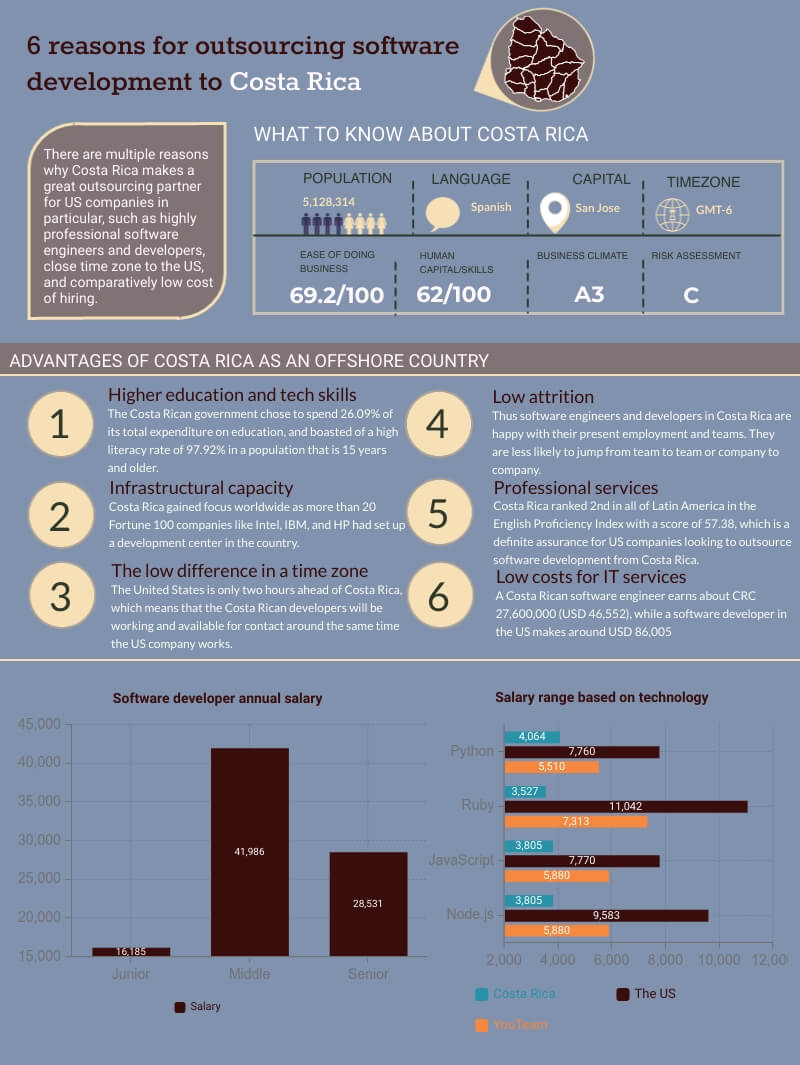While companies have always thought of countries in Asia as the top destinations for software development, there are other rising offshore outsourcing players, such as Central American countries. Costa Rica is one of them. There are multiple reasons why Costa Rica makes a great outsourcing partner for US companies in particular, such as highly professional software engineers and developers, close time zone to the US, and comparatively low cost of hiring.
This article will provide an overview of the average software engineers’ and developers’ salaries, the main advantages of outsourcing to Costa Rica, and what to consider before hiring.
Table of Contents
What to know about Costa Rica
- Capital: San Jose
- Official Languages: Spanish, Castilian, English
- Currency: Colon
- Population: 5,128,314
- Timezone: Central Standard Time. Costa Rica (GMT-6)
- Number of developers: 22,701+
- Average developer’s salary: $60,933 ⁽*¹⁾
- Business Climate: A3 ⁽*²⁾
- Risk Assessment: B ⁽*³⁾
- Political Stability: 0.9 ⁽*⁴⁾
- Ease of doing business: 69.2 ⁽*⁵⁾
⁽*¹⁾ according to Glassdoor, Senior Software Engineer, 7-9 years of experience.
⁽*²⁾ according to Coface. It includes the ease of running a business, the political situation in the country, and whether the legal system provides fair conditions and business protection for companies. Rating scales: A1, A2, A3, A4, B, C, D, and E.
⁽*³⁾ according to Coface. It refers to the country’s ability to transfer currency for foreign payments. Rating scales: A1, A2, A3, A4, B, C, D, and E.
⁽*⁴⁾ according to The World Bank. These statistics show the political stability and absence of violence. It ranges from -2.5 (lowest) to 2.5 (highest).
⁽*⁵⁾ according to The World Bank Doing Business 2020 report.
Why outsource to Costa Rica?
Costa Rica is a popular country in terms of outsourcing due to its numerous benefits. Apart from being a cost-effective destination, it also has a large talent pool of devs well versed in popular and rare technologies and programming languages. In addition to this, close time zones and a good understanding of English make it a very attractive option for US-based businesses.
Growing tech talent pool at Costa Rica
Known worldwide for good progress in healthcare and education, the Costa Rican government, as of 2020, have spent 21.54% of its GDP on education, which is significant and boasted of a very high literacy rate of 97.8% in a population that is 15 years and older.
Education is a field Costa Ricans are deeply passionate about. The central state-funded university, the University of Costa Rica, offers many scholarships each year to encourage students to enroll. Even without the scholarship, the fees are very reasonable. The Costa Rican government has made many efforts to make education at all levels affordable and accessible to all.
The Ministry of Education gives a lot of focus to technology, research and development, and innovation in the technology space. Several other universities, such as the Instituto Tecnologico de Costa Rica and the Universidad Técnica Nacional, offer fantastic technical courses to make the stepping stones to software development for budding developers.
During higher studies, there are many opportunities for Costa Rican students to engage in research and attempt innovation in their fields, particularly so for technology and the IT space. Thus, US companies considering software outsourcing from Costa Rica can be assured that the developers they hire from here have received a quality education and have stepped into the field of software development with a creative and innovation-oriented mindset.
High-quality tech infrastructure of Costa Rica
Costa Rica was already gaining attention and focus worldwide because more than 20 Fortune 100 companies like Intel, IBM, and HP had set up a development center in the country. But now, with even more focus paid to R&D efforts in the tech space, San Jose is being heralded as the Silicon Valley of Costa Rica. With huge and continually growing technological parks such as the American Free Zone and Global Park hosting hundreds of software development companies and renowned corporates from the health technology sector flocking in to develop groundbreaking medical devices.
In these tech parks, which are also often free trade zones, the software development companies enjoy certain tax benefits, which further encourage active growth and a keen interest in the IT outsourcing field.
The infrastructural growth of the Costa Rican IT sector does not stop there. The government put a lot of effort into creating a Tech City, which is expected to be completed in 2024. A Teach City will house many more tech companies, including outsourcing companies and corporates involved in R&D. However, as of the beginning of 2024, Tech City hasn’t been launched yet.
Close time zones between Costa Rica and the US
A significant concern US companies have about outsourcing work to foreign software development companies is regarding time zone. If the time zone is too far apart, it is not preferable for US companies as real-time communication is hardly feasible for both sides. However, with Costa Rica, this is not a concern as the United States is only two hours ahead of Costa Rica, which means that the Costa Rican developers will be working and available for contact around the same time the US company works. The time difference between Costa Rica and Western Europe is six hours, which is also not a critical situation.
The minute difference in time zones makes Costa Rica a nearshore location for outsourcing, and nearshoring itself is highly beneficial to companies, particularly those based in the US. This real-time collaboration is highly desirable. It makes the project progress smoother and faster because queries and issues are resolved quickly, and required changes can be made timely. That makes Costa Rica, a nearshore location for the US, an ideal place for US companies to outsource software development.
Low attrition of Costa Rican developers
Costa Rican developers are currently employed in a swiftly growing IT sector, allowing them to create and innovate in their jobs constantly. Thus software engineers and developers in Costa Rica are happy with their present employment and teams. They are less likely to jump from team to team or company to company.
This low attrition of developers is beneficial for US companies seeking to outsource software development to Costa Rica. It means that the company will most likely get to work with the same development team throughout the entire project. Most companies prefer that because this way, there is no loss of data and information that would have otherwise occurred if the team members kept changing, and the project continues without any disruption.
It also means that you get total value for money when you outsource software development to Costa Rican developers, as your experience is hassle-free. You don’t have to worry about issues like briefing new developers on the project.
Professional and multilingual developer team from Costa Rica
A vital issue US companies often worry about when outsourcing software development projects to Latin American countries is language barriers. The concern is that the software developers might not be able to converse fluently in English, leading to miscommunication and severe project errors.
However, that is not a problem one will face with Costa Rica since Costa Rican developers are conversant in English and can communicate in the language very well. Costa Rica ranked 4th in all of Latin America in the English Proficiency Index with a score of 536, which is a definite assurance for US companies looking to outsource software development from Costa Rica.
Moreover, there is no question about the quality of work provided by the Costa Rican software engineers and developers, as they are highly skilled in agile development practices and can deliver custom software development services with excellent proficiency.
The Costa Rican developers’ ability to speak English and deliver high-quality professional work is an attractive factor that makes Costa Rica an excellent destination for software development outsourcing. What seals the deal here is that if you choose to hire through YouTeam, you can select the software development team yourself and get matched with the developers, so you have the chance to get to know their capabilities and assess their work. This way, you gain trust in the outsourced team you will be working with soon. Additionally, if you consider hiring a team of developers, it can be beneficial for you if all of them speak Spanish. It will make communication faster, and you make sure there are no details lost in translation.
Reasonable hiring cost of Costa Rican engineers
US companies that choose Costa Rica for nearshoring software development services save a lot of money since Costa Rican developers’ hiring cost is less than what it would be if they decided to hire in-house developers from the US. A Costa Rican software engineer earns about CRC 36,000,000 (USD 61,084), while a software developer in the US makes around USD 101,727, which is much higher in comparison. Thus, even if hiring costs and bonuses are included, nearshoring software development to Costa Rica is more cost-effective.
How much does it cost to hire software developers in Costa Rica?
The average salary for software development in Costa Rica is around $67,000, but before comparing any salary rates, you should keep in mind that rates may vary based on educational background, years of experience, programming languages, libraries, and frameworks that developers know.
What are the yearly salary rates for junior, middle, and senior software engineers in Costa Rica?
Beware that the salary breakdown from PayScale we suggest below is based on the base salary, not including additional pay such as benefits, bonuses, overwork, commissions, and taxes. It may help you remember that the minimum average salary for Costa Rican IT workers is CRC 17,012,880 (USD 28,867) and the maximum average salary is CRC 50,400,000 (USD 85,518). However, the actual minimum and maximum rates may be lower and higher accordingly.
- The average yearly salary in Costa Rica for early-career software engineers (1-4 years of experience) is CRC 19,280,700 (USD 32,715), while for the same position in the US is USD 91,445.
- The average yearly salary in Costa Rica for mid-level software engineers is CRC 37,200,000 (USD 63,120); in the US, it is USD 63,120.
- The average yearly salary in Costa Rica for experienced software engineers is CRC 45,600,000 (USD 77,373); in the US, it is USD 151,358.
What are monthly salary rates in Costa Rica based on technologies?
The average monthly rate for developers with various technology skills can differ a lot. In the spreadsheet below, you can find information from Salary Explorer about monthly rates in Costa Rica due to popular technologies. In the second column, you can find data from Talent.com and Indeed about the same developers in the US. As you can see, US engineers are significantly more expensive.
However, you should understand that the salaries mentioned in the first column do not include taxes and additional expenses you can have when hiring a developer or a freelance engineer on local job boards. It only shows the money developers earn for their job.
So, we have added the third column to show the rates of software developers from Costa Rica that are offered on the YouTeam platform. These numbers mean the rates that you have to pay for a vetted software engineer from one of the top tech companies in Costa Rica.
| Average developers’ rates in Costa Rica | Average developers’ rates in the US | Rates of the developers from Costa Rica on YouTeam platform | |
| Python | $4,064 | $10,003 | $8,400 |
| JavaScript | $6,066 | $9,439 | $9,240 |
| Node.js | $5,546 | $9,462 | $9,240 |
| Ruby | $5,373 | $11,245 | $8,400 |
| PHP | $6,413 | $9,749 | $9,240 |
| .NET | $6,175 | $9,533 | $9,240 |
*In the first column, you can see the basic level of the developers’ average salary. This salary relates more to hiring in-house engineers in Costa Rica and it does not include taxes and benefits.
Hire developers from Costa Rica with YouTeam
What is the hourly rate for developers from Costa Rica?
Earlier, we have provided you with an overview of average salary rates in the country to give you an understanding of the market and how much you should be ready to spend. However, we have prepared a separate salary rates comparison for senior developers, as their rates higher than average.
In the table below you will find the average hourly rates of senior developers based on technology. In the first column, we have provided rates from Costa Rican local job boards and SalaryExplorer. This is a base salary without benefits, taxes, and bonuses. In the second column, you may find rates of US developers based on Glassdoor and Indeed data if you hire in-house. In the third column, we have prepared rates of the Costa Rican vendors from the YouTeam platform if you opt for staff augmentation.
| Costa Rica | US | YouTeam | |
| Senior JavaScript Developer | $35 | $82 | $65 |
| Senior Ruby Developer | $31 | $84 | $60 |
| Senior NodeJS Developer | $32 | $78 | $63 |
| Senior ReactJS Developer | $39 | $73 | $68 |
| Senior Python Developer | $37 | $79 | $67 |
Source: SalaryExplorer, Glassdoor, Indeed, YouTeam
What to watch out for working with software development companies in Coast Rica?
When you are considering getting outsourced software development for your next project, there are certain things you should watch out for and keep in mind. Whether it is Costa Rica you are seeking IT outsourcing from, or other countries such as Brazil, Ukraine, Argentina, etc., you should try to follow these practices to get the best project experience.
- Before you hire the development team, ensure that you verify and test the developers’ profiles thoroughly. That would mean going through the developers’ skill sets, asking for reviews of previous work they have done, and testing their capabilities. You can be sure you’ve made the right choice when you go for software outsourcing.
- A key aspect of software development outsourcing is that you work remotely with the developers on the other side. Because of this, ensure that you brief the development team members about all the dates and timelines of the project, including the completion of phases, timelines for query resolution, and delivery dates. That way, developers are clear on these details and will deliver the project on time.
- Just like you might have people on your team who take care of business processes, you should also have a technical person on hand. This person can oversee the development work and ensure that the developers deliver a real job, saving you time, effort, and even costs in the long run.
While these points were important to remember before proceeding with software development outsourcing, there are also a few things you should ensure during and throughout the project.
- Throughout the development process, it is essential that the technical person mentioned before should be a part of the entire project and should continually check the developer’s work. It is not to say that the developers don’t know how to do their job. Still, they might have been confused regarding exactly what the project needs, and your technical expert will be able to resolve those queries timely and accurately. Do not make the mistake of assigning this role to a non-technical person because by doing that, many errors may be overlooked or missed, and you might not know about the same until the last phases of the project, resulting in a loss of time and effort.
- Do make sure to communicate regularly with the outsourced team throughout the project. Apart from being one of the best business practices, regular and open communication is also essential when offshoring software development. There are no knowledge gaps, and both sides can remain updated about the project’s progress from the other end. Staying in touch with the developer team also enables them to reach out to you and your team for additional help they require, and likewise, your team can tell them openly what you need from them.
- Since timelines and delivery dates are so important when you outsource software projects, it is good to let the development team know that these timelines must be adhered to very closely. During the development process, if there is any unforeseen delay or an issue crops up that interferes with the pre-decided timeline, this must be communicated to the other side immediately by the respective team. It will ensure no miscommunication and that both teams can work in tandem to complete the project.
The above pointers will certainly help you have a smoother experience when deciding to go for offshoring development. However, no matter how careful you are and which country you hire from, remote outsourcing has its distinct disadvantages. These differ from country to country. Knowing what difficulties you may face with your outsourcing partner will prepare you better and help you find workarounds on those issues. Let’s see what possible challenges and/or drawbacks a company can face when seeking software outsourcing from Costa Rica.
Why outsourcing software development to Costa Rica might be risky?
Asian countries like India and China had paramount popularity as great outsourcing destinations in the late 90s and early 2000s. While these are still reasonably sought after, several factors, such as massive time zone differences and unreliable quality of work, have undermined their status.
Nowadays, countries from Latin America and Eastern Europe are gaining popularity. Still, while Costa Rica is an excellent option for US companies to seek nearshoring software development, there are certain disadvantages you may face when working with them.
The Costa Rican tax system mandates that every employee contributes a portion of their wages to social security, which is currently at 10.5%. While a greater amount of contribution is requested from the employer’s side, many software engineers are reluctant to shell out such a large sum. They are known to ask for below-the-table payments in return for their acceptance of the job. That can present difficulties for US companies looking to outsource software development from Costa Rica, as many developers may refuse to work unless given that pay.
That brings forth another drawback of outsourcing software development to Costa Rica—compliance and understanding of business laws. Business laws in Costa Rica are increasingly complicated, which many US companies might find frustrating and hard to understand. They might need to seek separate legal counsel for this, which is an extra expense and hassle some companies might not be willing to take up.
Moreover, seemingly simple processes are impeded by the labyrinthian Costa Rican laws, demanding much paperwork and getting expensive. Additionally, the country’s corporate income is taxed at a 30% rate; however, it can vary based on many reasons and reach even 50%. That’s why it’s essential to ask for legal counsel services and not do it yourself.
Another problem US companies might face is regarding the developers’ technical qualifications and experiences. Although most Costa Rican developers are dedicated, talented professionals, only a few large software development companies hire within Costa Rica. Thus, many of the developers you encounter might not have experience working with those. However, companies can always test the developers well before committing to hiring them to assess their actual skill levels, so that should not be a major issue.
Luckily, most of these disadvantages can be overcome. For instance, when you hire Costa Rican engineers with YouTeam, you work only with our trusted partners, the country’s top agencies. Each partner was qualified based on our vetting process.
Where to hire developers from Costa Rica?
If you decide to outsource to Costa Rica, you may have three options:
- remote contracting websites,
- traditional outsourcing,
- marketplace for hiring individuals and teams.
Remote contracting websites
There are some local job boards where you can post the job offer and look for developers:
- Buscojobs–718+ job offers.
- Talent.com–5 570+ job offers
Traditional outsourcing
Suppose you are not aware of the outsourcing software development market in Costa Rica. In that case, you may be at the risk of finding an unreliable partner if you go with a traditional outsourcing option. You may look for the company’s reviews and rates on Clutch.co; however, such a vetting process may take a lot of time.
Marketplace for hiring individuals and teams
Another option is to try a platform for hiring individuals and teams. YouTeam is the #1 solution for rapid engineering staff augmentation in the world. It leverages a network of 50,000 vetted engineers in Europe and Latin America.
Key takeaways
Although there are many choices globally to seek software outsourcing from, Costa Rica is one of the best options a US company can go for. Here are some key takeaways as to why Costa Rica is a phenomenal destination for outsourcing software development
- Growing talent pool. Costa Rica has paved the way for education in Latin America, focusing on all learning levels and top universities that produce highly skilled software developers among professionals in various other fields.
- High-quality tech infrastructure. San Jose, the capital of Costa Rica, is a fast-growing IT hub filled with tech companies and outsourcing companies that are all continually working to innovate in the tech space.
- Close time zones. Being only two hours behind the US, Costa Rica offers real-time collaboration opportunities to US companies that approach nearshoring. This quick communication maintains the speed of the project and ensures queries are resolved quickly.
- Low attrition of developers. Costa Rican developers are less likely to jump to another team in the middle of a project, so US companies will enjoy working with the same team members throughout the project.
- Professional and multilingual developer team. Costa Rican software engineers and developers are highly talented professionals, and as a major advantage, are fluent in English, which eliminates language barriers and ensures smooth communication.
- Reasonable hiring cost. Costa Rican developers’ hiring costs are much lower than hiring in-house US-based developers, which provides a significant cost saving for US companies.








